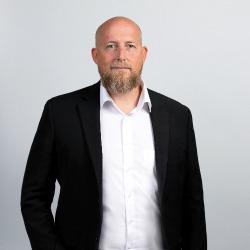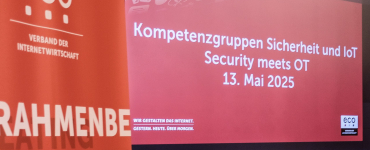On 29 June, eco will host a German-language event to discuss the topic of “IIoT in Practice: Essential Building Blocks of Industry 4.0.” In addition to a tour of the smart maufacturing facility, experts will give keynote speeches from various perspectives on current IIoT issues. In the run-up to the event, we spoke with Marcel Klein, Strategic Partner Manager, plusserver, about data lakes and digital sovereignty and the central challenges of Industry 4.0. Participants will learn more about this topic during his keynote speech at the “IIoT in Practice: Essential Building Blocks of Industry 4.0” event on 29 June on the premises of RITTAL in Haiger. Register now for free
According to the results of a survey conducted by the opinion research institute Civey on behalf of eco Association in the run-up to the Hannover Messe, 83.7 per cent of IT experts in Germany believe that German industry is rather poorly positioned in terms of digitalisation compared to other countries. Where do you see the major challenges in the area of Industry 4.0?
Marcel Klein: Broken down to the German market, the major challenges from our point of view revolve around data strategy and the concern about dependencies. Shop floor and machine data are fundamental components of corporate success in the industrial sector. However, their potential can only be unleashed if the data is also made usable – be it in the cloud itself or in applications and solutions for customers. In this regard, ignorance and worry (about the theft of intellectual property or trade secrets, for example) hinder companies.
This is often accompanied by a lack of a data strategy. Many companies know too little about what data needs to be protected and how, where the data should be kept and how to move it sensibly between different instances. If you do not do your homework, don’t be surprised if the development of new service concepts or innovative solutions in the smart factory area fail.
To catch up with Industry 4.0, companies urgently need to address issues such as data security, and the standardisation of interfaces and ecosystems to develop solutions according to demand.
Data lakes form the basis for technologies such as machine learning, big data analytics and predictive analytics in the smart factory and Industry 4.0. An important aspect of the broad topic of data management is the data sovereignty of said data. What requirements should IT managers be aware of in order to enable and benefit from data sovereignty?
Marcel Klein: I am always amazed by considering how strongly the term data sovereignty encompasses all aspects of this multifaceted topic. That is why we at plusserver prefer to speak of “digital sovereignty”. The reason for this is quite simple: while “data sovereignty” usually only asks the question of data control (“Am I in control of my data?”), the concept of digital sovereignty goes much further by also looking more closely at aspects such as data protection, the question of legal space and operational as well as technological sovereignty. All these aspects come into play, especially in Industry 4.0. Those who intend to drive innovation in the cloud with business-critical data must not suffice with saying: “This is my data”. The point is to demand the maximum possible transparency, both in terms of the storage location and the operational processes. If the infrastructure provider, for example, of my data lake, does not perform as expected, it must be possible to pull or transfer the data quickly and cost-effectively.
As a speaker at the event “IIoT in Practice: Essential Building Blocks of Industry 4.0” on the topic of “IoT Requirements for a (Sovereign) Data Lake Cloud”. What key insights can participants expect from your presentation?
Marcel Klein: Together, we will explore the question of what digital sovereignty means for industrial companies in concrete terms and which technological aspects a cloud solution must bring with it so that the requirements of I(I)oT are covered. In the end, the participants should have a checklist in mind that gives them orientation and enables them to evaluate existing services and make an informed choice of a future provider.
Thank you very much for the interview!




